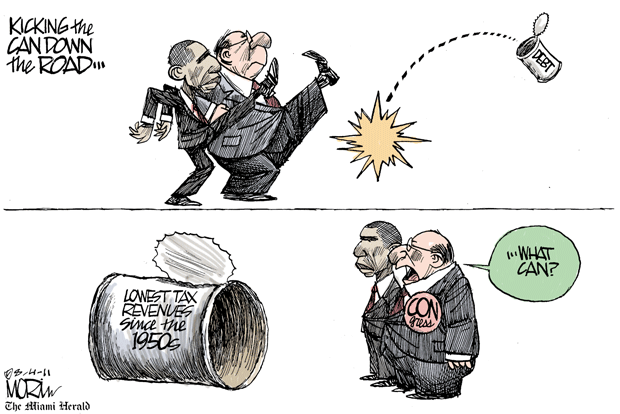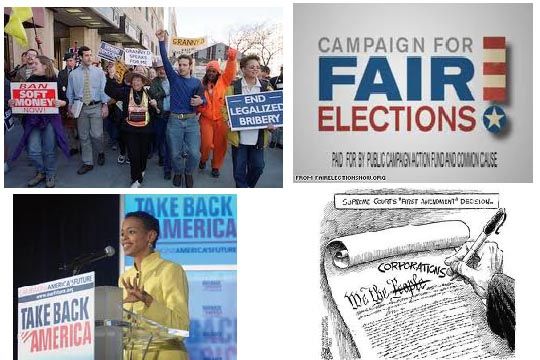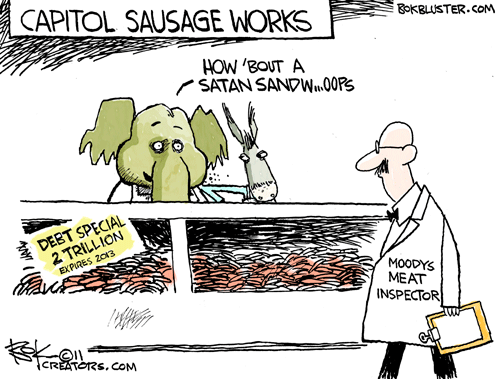“Punting the Pundits” is an Open Thread. It is a selection of editorials and opinions from around the news medium and the internet blogs. The intent is to provide a forum for your reactions and opinions, not just to the opinions presented, but to what ever you find important.
Thanks to ek hornbeck, click on the link and you can access all the past “Punting the Pundits”.
Richard Wolff: The S&P Downgrade of US Debt: What it Means

Much verbiage is piling up on this issue. Yet, it matters little that the two other giant rating agencies did not downgrade US debt as S&P did. It is likewise unimportant that all those agencies deserve the bad reputations won when their over-rating of securities burst in the collapse of 2007 and took an already unbalanced economy into deep recession. Nor does the downgrade impose major cash costs anytime soon.
The S&P downgrade is important because it clarifies and underscores two key dimensions of today’s economic reality that most commentators have ignored or downplayed. The first dimension concerns exactly why the US national debt is rising fast. There are three major reasons for this: (1) major tax cuts especially on corporations and the rich since the 1970s and especially since 2000 have reduced revenues flowing into Washington, (2) costly global wars especially since 2000 have increased government spending dramatically, and (3) costly bailouts of dysfunctional banks, insurance companies, large corporations and the economic system generally since 2007 have likewise sharply expanded government spending. With less tax revenue coming in from corporations and the rich and more spending on defense/wars and bailouts, the government had to borrow the difference. Duh!
Robert Reich: Why S.& P. Has No Business Downgrading the US
Standard & Poor’s downgrade of America’s debt couldn’t come at a worse time. The result is likely to be higher borrowing costs for the government at all levels, and higher interest on your variable-rate mortgage, your auto loan, your credit card loans, and every other penny you borrow.
Why did S&P do it?
snip
S&P has downgraded the U.S. because it doesn’t think we’re on track to reduce the nation’s debt enough to satisfy S&P – and we’re not doing it in a way S&P prefers.
The Obama administration has a strange habit of inappropriately blaming the unpopularity of their actions on the fact that a few progressive writers didn’t do enough to sell the public on the good aspects of their deal.
It would seem the White House is basically taking the perspective of a Scooby Doo villain in concluding why their brilliant plans fail. Hanging upside down in a comically oversize net with their rubber monster mask removed they yell, “we would have gotten away with it, too, if it hadn’t been for you meddling progressive bloggers!”
Thom Hartmann: Mainstream Media Ignores S&P Attack On Republicans
Have you seen, anywhere, in any media, or even heard reported or repeated on NPR, the following sentence? “We have changed our assumption on this because the majority of Republicans in Congress continue to resist any measure that would raise revenues, a position we believe Congress reinforced by passing the act.”
It’s right there on Page 4 of the official Standard & Poors “Research Update” – the actual report on what they did and why – published on August 5th as the explanation for why they believe Congress – and even the Gang of Twelve – will be unable to actually deal with the US debt crisis.
Perhaps it’s just lazy – the bullet points at the beginning of the report don’t mention the Republicans or taxes, but instead just say, for example (part of one of six quick bullet-points): “[T]he downgrade reflects our view that the effectiveness, stability, and predictability of American policymaking and political institutions have weakened at a time of ongoing fiscal and economic challenges…”
Jeff Goodell: An Environmental Upside to the Horrible Debt Deal?
With the debt-ceiling deal done, the details of who feels the most pain from the next ($1.6 trillion) round of cuts will be left up to a 12-person congressional “supercommittee,” to be formed in the coming weeks. But you can bet that funding for dramatic action on climate change and toxic mercury pollution is not going to win out over funding for bedpans and missiles.
In fact, as others have pointed out, cutting trillions out of the federal budget is likely to mean massive cutbacks in the regulatory arm at the EPA, the gutting of clean-energy funding at the Department of Energy, and goodbye to any hopes of infrastructure spending for little projects like, say, a 21st-Century electricity transmission grid. Erich Pica, head of Friends of the Earth, pretty much summed it up: “The draconian cuts passed are likely to mean more people out of work, more people drinking poisoned water and breathing polluted air, and a slower transition to a clean energy economy.”
All true. But maybe there’s an upside, too.
Jim Hightower: America’s Real Job Creators Are Broke
Despite the GOP’s ideological claptrap about corporate executives being “job creators,” it’s ordinary Americans who actually create jobs.
You see, despite the GOP’s ideological claptrap about corporate executives being “job creators,” it’s ordinary Americans who actually create jobs by spending from their paychecks. This is why our obtuse policymakers need to quit pampering the rich and fussing over budgets.
Instead, they should launch a national, FDR-style jobs program that will immediately increase paychecks, perk up consumer spending, and generate grassroots economic growth.
Ray McGovern: They Died in Vain; Deal With It
Many of those preaching at American church services Sunday extolled as “heroes” the 30 American and 8 Afghan troops killed Saturday west of Kabul, when a helicopter on a night mission crashed, apparently after taking fire from Taliban forces. This week, the Fawning Corporate Media (FCM) can be expected to beat a steady drumbeat of “they shall not have died in vain.”
But they did. I know it is a hard truth, but they did die in vain.
As in the past, churches across the country will keep praising the fallen troops for protecting “our way of life,” and few can demur, given the tragic circumstances.
But, sadly, such accolades are, at best, misguided – at worst, dishonest. Most preachers do not have a clue as to what U.S. forces are doing in Afghanistan and why. Many prefer not to think about it. There are some who do know better, but virtually all in that category eventually opt to punt.
Should we fault the preachers as they reach for words designed to give comfort to those in their congregations mourning the deaths of so many young troops? As hard as it might seem, I believe we can do no other than fault – and confront – them. However well meaning their intentions, their negligence and timidity in confronting basic war issues merely help to perpetuate unnecessary killing. It is high time to hold preachers accountable.




Recent Comments